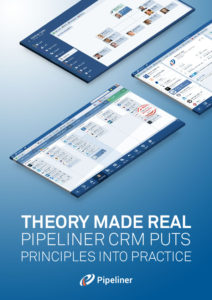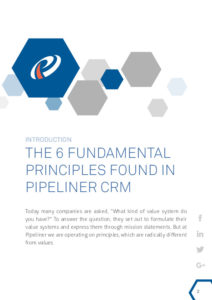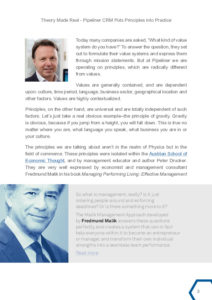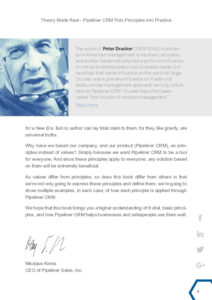At Pipeliner, we operate on principles instead of values. The difference between these two terms is significant. Values are dependent upon: culture, time, era, language, business sector, geographical location, and other factors. They are highly contextualized.
Principles, on the other hand, are universal and are totally independent of such factors. An example is the principle of gravity. Gravity is obvious, because if you jump from a height, you will fall down. This is true no matter where you are, what language you speak, what business you are in, or your culture.
The principles we are talking about aren’t in the realm of Physics but in the field of commerce. These principles were defined and developed within the Austrian School of Economics, and more recently by management educator and author, Peter Drucker.
Why have we based our company, and our product, on principles instead of values? Simply because we want Pipeliner CRM to be a tool for everyone. And since these principles apply to everyone, any solution based on them will be extremely beneficial.
Today many companies are asked, ‘What kind of value system do you have?’ To answer the question, they set out to formulate their value systems and express them through mission statements. But at Pipeliner we are operating on principles, which are radically different from values.
Nikolaus Kimla
CEO of Pipelinersales Inc.
Applying Principles
The 6 fundamental principles are:
1. Focus on Results
The primary measure of any organization could be said to be its results—what it achieves. In fact an organization is actually founded for the purpose of achieving results. Along with this, management could be defined as “a profession of achieving results”.
2. Contribution to the Whole
Every aspect of an organization contributes to the whole. Any executive attempting to lead a company to success should not only realize this, but must be able to visualize how each piece contributes; in other words, to see the big picture.
3. Concentration on a Few Things
If one is interested in obtaining results, it is accomplished by limiting oneself to concentration on a few things, to a small number of carefully selected key factors.
4. Utilizing Strengths
In business, as in society, we tend to focus on weaknesses in an effort to fix or strengthen them. A much more powerful method is to concentrate on strengths and bolster them.
5. Positive Thinking
Positive thinking can be applied by looking at it this way: In every problem there is a hidden opportunity for change.
That is the difference between someone who is just trying to “think happy thoughts” in the face of adversity, and someone who can bring about truly positive change. Effective people actually look at a problem or issue and face up to it, instead of glossing over or ignoring it. Beyond that, they seek possibilities and opportunities in every problem.
6. Trust
Finally, we arrive at the most important principle for the future: Trust. From the beginning, trust is a crucial component for ongoing success. Without trust, you can apply management techniques and still miss by a mile. If your employees don’t trust you, how closely will they adhere to your policies, strategies and orders?
Just as values differ from principles, this book differs from others in that we not only express these principles and define them, we show multiple examples, in each case, of how each principle is used in Pipeliner CRM.
Download and read Theory Made Real: Pipeliner CRM Puts Principles into Practice.


































Comments